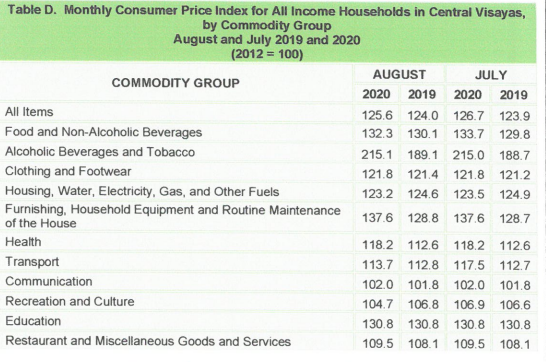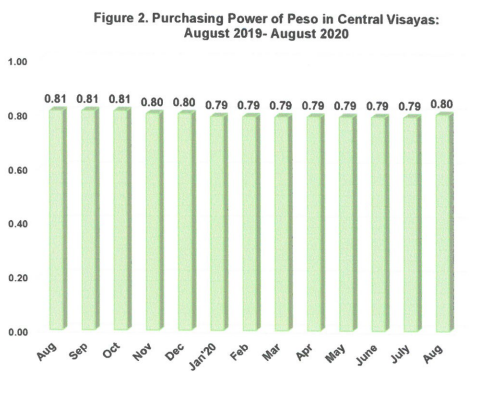Starting March 2018, the Philippine Statistics Authority (PSA) released the rebased CPI series as announced in the press release number 2018-031 dated 22 February 2018. The CPI series for July 2018 onwards shall be 2012-based.
Year on Year Inflation rate in Central Visayas was recorded at 1.3 percent
The inflation in Central Visayas exhibited a slower pace for August 2020 at 1.3 percent which was lower than the 2.3 percent annual increase in July 2020. In August 2019, inflation was at 1.0 percent (Table A).

The slowdown in the inflation was mainly driven by the decline in the inflation of the Food and Non-Alcoholic Beverages index at 1.7 percent during the month from 3.0 percent in July 2020 (Table B). The downtrend in the inflation was also brought about by the decrease in the indices of the following commodity groups during the month:
Alcoholic Beverages and Tobacco, 13.7%;
Clothing and Footwear, 0.3%;
Furnishing, Household Equipment and Routine Maintenance of the House; 6.8%;
Transport, 0.8%
Recreation and Culture, -2.0%;
Meanwhile, indices of the rest of the commodity groups retained their previous month’s annual growth rates
Housing, Water, Electricity, Gas, and Other Fuels, -1.1%;
Health, 5.0%;
Communication, 0.2%;
Education, 0.0%
Restaurant and Miscellaneous Goods and Services, 1.3%
August 2020 CPI in Central Visayas was recorded at 125.6
The CPI for Central Visayas was recorded at 125.6 for August 2020 which was lower than the 126.7 from the previous month. An increasing movement of the CPI was recorded from August 2019 at 124.0 to August 2020 at 125.6. The month of October 2019 recorded the lowest CPI from the series while August 2020 recorded the lowest CPI in 2020 (Figure 1).

Higher annual rate was noted in the indices of each commodity group from July and August 2020 compared to July and August 2019 except for Housing, Water, Electricity, Gas, and Other Fuels which posted a decrease in the indices in July and August 2020. Recreation and Culture posted a decrease in index in August 2020 but compared to August 2019 but constant in July 2019 and 2020. Education also posted a constant index for July and August 2019 and 2020 (Table D).

Purchasing Power of Peso (PPP) was recorded at 0.80 in August 2020
Purchasing Power of Peso in Central Visayas was recorded at 0.80 in August 2020. The purchasing power of peso for the month at 0.80 is lower than the purchasing power of peso of August 2019 at 0.81 and a downtrend movement of the PPP was recorded starting August last year until August 2020. A constant PPP was observed in the months of August 2019 to October 2019 at 0.81. It decreases to 0.80and remain constant in the months of November and December 2019. In August 2020, PPP increased to 0.80 after being constant in the previous months starting January of this year (Figure 2).

TECHNICAL NOTES
The Philippine Statistics Authority generates and announces the monthly Consumer Price Index (CPI) based on a nationwide survey of prices for a given basket of goods and services. Two important indicators, the inflation rate and purchasing power of the peso (PPP), are derived from the CPI which are important in monitoring price stability and the value of the country’s currency.
The CPI is an indicator of the change in the average retail prices of a fixed basket of goods and services commonly purchased by households relative to a base year.
Retail Price is the price at which a commodity is sold for spot in small quantities for consumption.
Base Period/Base Year is the period, usually a year, at which the index number is set to 100. It is the reference point of the index number series.
Market Basket is a term used to refer to a sample of goods and services that are commonly purchased and bought by an average Filipino household.
Weight is a value attached to a commodity or ground of commodities to indicate the relative importance of that commodity or group of commodities in the market basket.
Inflation Rate is equivalent to a decline in the purchasing power of the peso. It is the change in the CPI over a specific period of time (usually a month or a year). That is, where:
CPI1 - is the CPI in the previous period
CPI2 - is the CPI in the current period
The Purchasing Power of the Peso (PPP) is a measure of the real value of the peso in a given period relative to a chosen reference period. It is computed by getting the reciprocal of the CPI and multiplying the result by 100. That is,
Headline Inflation is the rate of change in the weighted average prices of all goods and services in the CPI basket.
Approved by:
(SDG.) ARIEL E. FLORENDO
Regional Director

